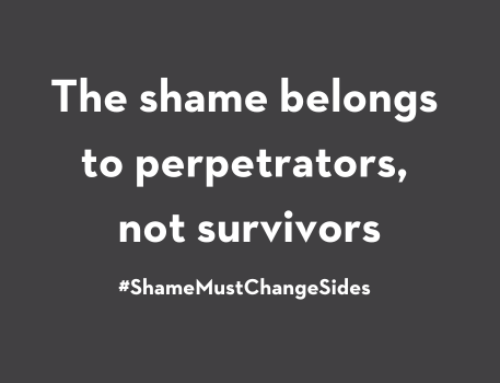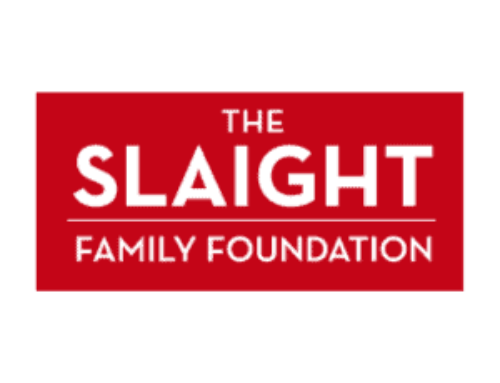Sometimes, it’s the personal stories that can light a fire. Because in the flurry of activity around the viral Signal for Help, a hand gesture we released that means “I need your help”, we can forget we’re talking about real people.
That’s why we’re releasing the Signal for Help podcast, a mini-series you don’t want to miss.
Gender-based violence is a problem, and we want to support survivors. But too many people who face abuse are shamed, silenced, and stigmatized, and too many people don’t feel confident in supporting them. The Signal for Help podcast explores how we can play a helping role through validation, active listening, and a survivor-led approach.
Today, you’re getting a sneak peak of the first episode of the Signal for Help podcast, released this week. It’s hosted by award-winning journalist, professor, and former CBC Radio One host Nana aba Duncan and produced by Media Girlfriends.
This episode features Eternity Martis, journalist and editor who has worked with The Huffington Post, Chatelaine, Maclean’s, CBC, The Walrus, and more. In 2021, she published “They Said This Would Be Fun: Race, Campus Life, and Growing Up”, her bestselling memoir of her experiences with racism, partner abuse, and so much more at university.
A note about content: this episode includes discussion of gender-based violence.
If you prefer to listen en Français, check out our French Appel à l’aide podcast produced by Zoé Gagnon-Paquin, coming in April.
Easily listen to Signal for Help in your podcast app of choice (captivate.fm)
Transcript
00:00:04 Andrea
The Signal for Help silently communicates I need your help without leaving a digital trace.
People have used it to get help in dangerous situations.
But what are the hidden stories behind the signs of abuse?
00:00:18 Andrea
I’m Andrea Gunraj at the Canadian Women’s Foundation.
Welcome to Alright, Now What?, a podcast from the Canadian Women’s Foundation. We put an intersectional feminist lens on stories that make you wonder “Why is this still happening?” We explore systemic roots and strategies for change that will move us closer to the goal of gender justice.
The work of the Canadian Women’s Foundation and our partners takes place on traditional First Nations, Métis, and Inuit territories. We are grateful for the opportunity to meet and work on this land. However, we recognize that land acknowledgements are not enough. We need to pursue truth, reconciliation, decolonization, and allyship in an ongoing effort to make right with all our relations.
00:01:06 Andrea
I’ve talked about it here before. We launched the award-winning Signal for Help hand gesture in 2020 in the wake of rising intimate partner violence, family violence and sexual assault, as well as the rising use of video calls.
It has gone viral as people share it and use it to get help in situations that make the news, to give everyone tools they need to respond to any sign or signal of abuse.
We also launched a Signal for Help Responder learning journey. Anyone can sign up for it at signalresponder.ca to get tips and training to build their confidence and competence in helping family, friends and co-workers who may be facing abuse. Today, 41% of people in Canada know about the Signal for Help and 9% have seen it used or used it themselves.
Over 42,000 people have signed up as Signal for Help Responders and a survey of over 500 people who went through the responder learning journey, 88% say they are more confident in supporting people who disclose abuse and 87% are more confident referring them to appropriate services.
In my years doing public education on gender-based violence, I have never seen this scope of reach, awareness and results. I’m thrilled so many people want to play their part in ending abuse, but I’m restless too.
Gender-based violence has gone up in the past few years around the world.
Femicides have gone up in Canada.
Those at elevated risk of abuse, like women with disabilities, Indigenous women and women in the North are only at greater risk now.
This violence is 100% preventable. When will we finally end it? When will we take what survivors go through seriously and truly believe we can change our cultures of stigma and silence to cultures of support?
Sometimes it’s the personal stories that can light a fire because in the flurry of activity around the Signal for Help, we can forget that we’re talking about real people. That’s why we’re releasing the Signal for Help podcast, a mini series you don’t want to miss.
Yes, gender-based violence is a problem. And we want to support survivors, but too many people who face abuse are shamed, silenced and stigmatized, and too many people don’t feel confident in supporting them.
The Signal for Help Podcast explores how we can play a helping role through validation, active listening, and a survivor-led approach.
Today you’re getting a sneak peak of the English Signal for Help podcast released this week. It’s hosted by award-winning journalist, professor and former CBC radio host Nana aba Duncan. It’s produced by Media Girlfriends.
A note about content. This episode includes discussion of gender-based violence.
Full episode transcript: New Podcast Episode with Eternity: Listen without judgement – Canadian Women’s Foundation






